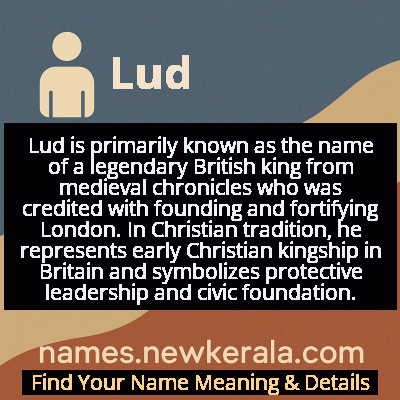Lud Name Meaning & Details
Origin, Popularity, Numerology Analysis & Name Meaning of Lud
Discover the origin, meaning, and cultural significance of the name LUD. Delve into its historical roots and explore the lasting impact it has had on communities and traditions.
Name
Lud
Gender
Male
Origin
Christian
Lucky Number
1
Meaning of the Name - Lud
Lud is primarily known as the name of a legendary British king from medieval chronicles who was credited with founding and fortifying London. In Christian tradition, he represents early Christian kingship in Britain and symbolizes protective leadership and civic foundation.
Lud - Complete Numerology Analysis
Your Numerology Number
Based on Pythagorean Numerology System
Ruling Planet
Sun
Positive Nature
Leaders, ambitious, highly driven, self-reliant, innovative.
Negative Traits
Overly aggressive, domineering, impatient, selfish.
Lucky Colours
Red, orange, gold.
Lucky Days
Sunday.
Lucky Stones
Ruby, garnet.
Harmony Numbers
2, 3, 9.
Best Suited Professions
Entrepreneurs, managers, engineers.
What People Like About You
Courage, determination, leadership.
Famous People Named Lud
King Lud
Legendary King
Mythical founder of London and namesake of Ludgate
Lud Gluskin
Musician/Conductor
Prominent orchestra leader in radio and film during mid-20th century
Ludovic Kennedy
Broadcaster/Author
Influential British journalist and naval historian
Name Variations & International Equivalents
Click on blue names to explore their detailed meanings. Gray names with will be available soon.
Cultural & Historical Significance
In Christian tradition, while Lud doesn't appear in biblical texts, he became incorporated into Christian historical narratives through medieval chroniclers who sought to create a continuous Christian history for Britain stretching back to pre-Roman times. The name appears in various Arthurian legends and Christian historical traditions as an ancestor of later Christian kings, blending Celtic mythological roots with Christian royal lineage. The enduring legacy is visible in London's Ludgate, one of the original city gates named after King Lud, creating a tangible connection between mythological past and physical present that has persisted for centuries.
Extended Personality Analysis
Individuals bearing the name Lud are typically associated with strong leadership qualities, practical wisdom, and a protective nature. Drawing from the mythological King Lud who fortified cities and established order, these individuals often exhibit natural organizational abilities and a talent for building stable structures in their personal and professional lives. They tend to be grounded, responsible figures who prioritize security and long-term planning, reflecting the legendary king's role as a city founder and defender. Their approach to challenges is typically methodical and strategic rather than impulsive.
There's also a strong sense of tradition and historical consciousness associated with the name. Luds often demonstrate deep interest in heritage, cultural preservation, and understanding how past foundations influence present circumstances. They may be perceived as somewhat reserved or serious, but this masks a deep commitment to their community and principles. The mythological connection suggests individuals who value legacy and enduring impact, often serving as stabilizing forces in their families or organizations. Their strength lies in quiet determination rather than flashy displays, making them reliable anchors during times of uncertainty.
Modern Usage & Popularity
In contemporary naming practices, Lud remains an exceptionally rare choice, primarily confined to families with specific interest in British mythology or Celtic heritage. Its usage saw minor revivals during periods of medieval romanticism, particularly the Victorian era, but never achieved mainstream popularity. Today, the name is most likely encountered in historical fiction, fantasy literature, or among enthusiasts of Arthurian legends. Its distinctive archaic quality makes it memorable but limits broad appeal in an era favoring more contemporary-sounding names. The name occasionally appears in gaming and fantasy communities as character names, maintaining its mythological connections while adapting to modern creative contexts. Its extreme rarity ensures that bearers stand out, though it may require frequent explanation of its historical significance.
Symbolic & Spiritual Meanings
Symbolically, Lud represents the foundational principles of civilization, protection, and cultural continuity. As the mythical builder of London's protective walls, the name embodies the human impulse to create safe, structured communities from chaotic wilderness. It symbolizes the transition from nomadic existence to settled urban life, representing human achievement in establishing lasting institutions that protect and nurture future generations. The name also carries connotations of legacy and historical consciousness, serving as a bridge between mythological past and tangible present.
Metaphorically, Lud represents the archetype of the protective patriarch or civic founder - someone who establishes systems, boundaries, and institutions that endure beyond their lifetime. It symbolizes the concept that modern societies rest upon ancient foundations, both literal and metaphorical. The name suggests that true strength lies not in conquest but in creation and preservation, emphasizing the importance of building structures - whether physical, social, or moral - that can withstand the tests of time and provide security for communities.

